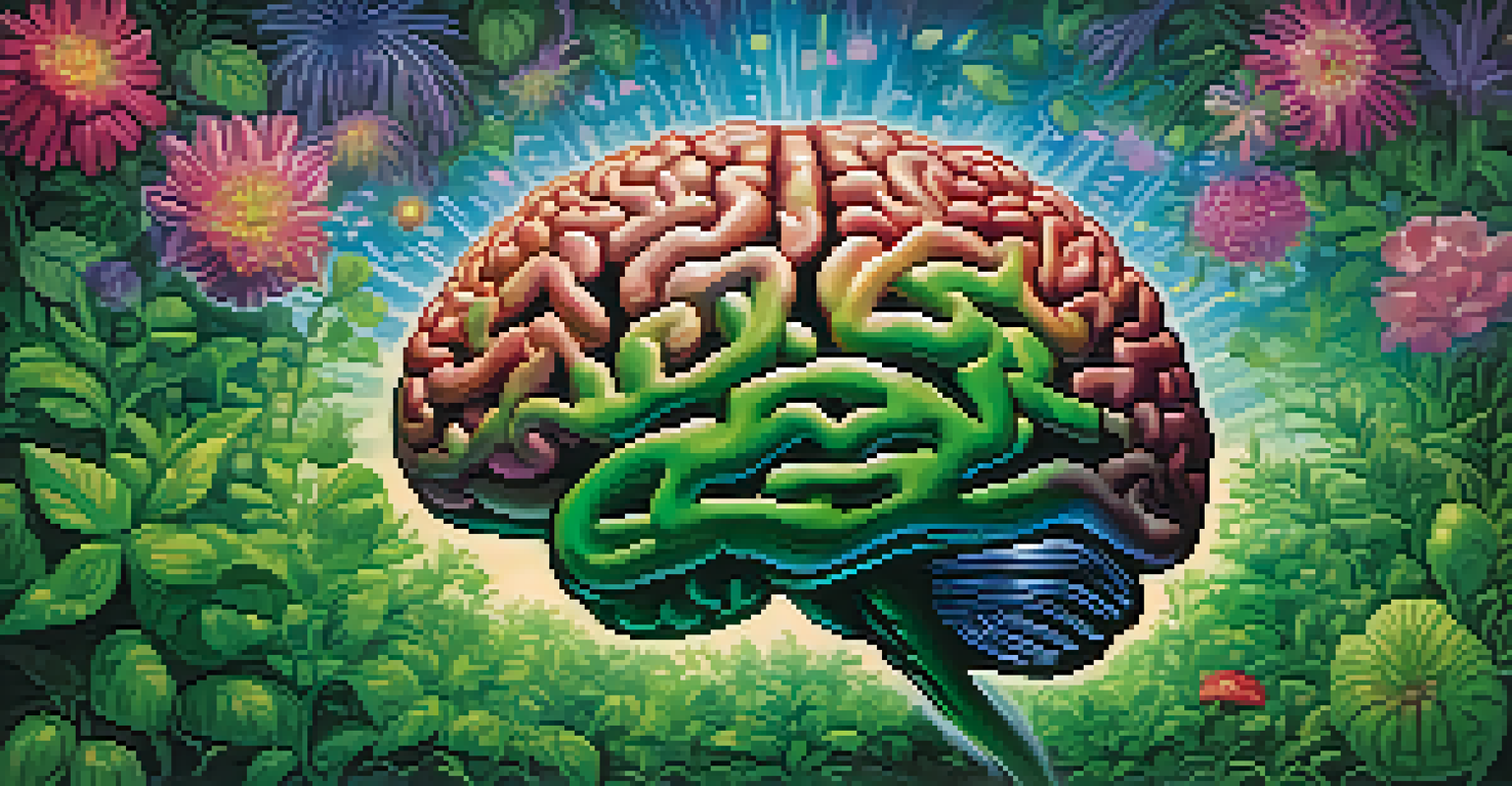Marijuana's Neuroprotective Effects in Animal Studies

Understanding Neuroprotection: What It Means
Neuroprotection refers to the mechanisms that protect the nervous system from injury or degeneration. This concept is vital in understanding how certain compounds can help preserve brain function. Think of it as a shield for your brain, preventing damage from various stressors like toxins or inflammation.
Cannabinoids have shown promise in modulating the inflammatory response, making them a focal point in research.
In the context of marijuana, researchers are particularly interested in how cannabinoids, the active compounds in cannabis, might provide this protective effect. These compounds interact with the brain's endocannabinoid system, which plays a crucial role in regulating various physiological processes. By enhancing neuroprotection, cannabinoids could potentially mitigate the effects of neurodegenerative diseases.
Animal studies are essential in this area of research, as they allow scientists to observe the effects of cannabinoids in controlled environments. By studying the response of animal models to these compounds, researchers can gather insights that might inform future human studies.
Key Cannabinoids: THC and CBD
Tetrahydrocannabinol (THC) and cannabidiol (CBD) are two of the most well-known cannabinoids found in marijuana. THC is the psychoactive component that produces a 'high,' while CBD is non-psychoactive and has gained attention for its therapeutic potential. Both compounds appear to have unique effects on neuroprotection, making them valuable subjects of study.

Research indicates that THC may help reduce inflammation and oxidative stress in the brain, both of which can contribute to neurodegenerative conditions. On the other hand, CBD has been shown to promote neurogenesis, the process of generating new neurons, which is crucial for brain health. Think of this as a way to rejuvenate the brain, potentially leading to improved cognitive functions.
Neuroprotection Shields the Brain
Neuroprotection involves mechanisms that safeguard the nervous system from damage, with cannabinoids like THC and CBD showing potential in enhancing brain health.
Together, THC and CBD may offer a synergistic effect, enhancing each other's neuroprotective properties. This combination is a significant focus in animal studies, helping researchers understand how these cannabinoids work together to safeguard brain health.
Animal Models in Neuroprotection Research
Animal models, such as mice and rats, are frequently used in neuroprotection studies to mimic human brain conditions. These models allow researchers to investigate the effects of cannabinoids on various neurodegenerative diseases, including Alzheimer's and Parkinson's. By observing changes in behavior and brain function, scientists can gather valuable data.
Neurogenesis is like planting new seeds to ensure a lush, healthy landscape.
For instance, studies have shown that administering cannabinoids to mice with induced neurodegeneration can lead to improvements in memory and cognitive abilities. This suggests that these compounds may not only slow down disease progression but could also enhance overall brain health. It's like giving the brain a second wind, helping it perform better even in the face of challenges.
Additionally, researchers can manipulate these animal models to explore different dosages and combinations of cannabinoids. This flexibility provides insights into the most effective treatments, which could ultimately inform human clinical trials and therapies.
Effects of Cannabinoids on Inflammation
One of the critical aspects of neuroprotection is managing inflammation in the brain. Chronic inflammation can lead to neuronal damage and is often associated with various neurodegenerative diseases. Cannabinoids have shown promise in modulating this inflammatory response, making them a focal point in research.
Studies involving animal models have demonstrated that cannabinoids can reduce the levels of pro-inflammatory cytokines, which are molecules that signal inflammation. By decreasing these markers, cannabinoids may help protect neurons from damage, similar to how anti-inflammatory medications work to reduce swelling and pain in the body.
Cannabinoids Promote New Neurons
Research indicates that cannabinoids, especially CBD, may stimulate neurogenesis, fostering the growth of new neurons and supporting cognitive functions.
This anti-inflammatory effect can be particularly beneficial in conditions like multiple sclerosis, where inflammation plays a significant role in disease progression. The ability of cannabinoids to curb inflammation opens up exciting possibilities for therapeutic interventions aimed at preserving brain health.
Neurogenesis: The Growth of New Neurons
Neurogenesis, or the formation of new neurons, is essential for maintaining cognitive functions and overall brain health. Interestingly, research suggests that cannabinoids, particularly CBD, may promote neurogenesis, offering new avenues for treatment in neurodegenerative diseases. Imagine your brain as a garden; neurogenesis is like planting new seeds to ensure a lush, healthy landscape.
Animal studies have provided compelling evidence that CBD can stimulate the growth of new neurons in the hippocampus, a region of the brain associated with memory and learning. This could lead to improved cognitive abilities and resilience against age-related cognitive decline. It's a fascinating area of research that highlights the potential of cannabinoids to not just protect existing neurons but also foster new growth.
Promoting neurogenesis could have far-reaching implications for treating conditions such as depression and anxiety, which are often linked to diminished neuron health. By harnessing the neurogenic potential of cannabinoids, researchers hope to develop innovative therapies that enhance mental well-being.
Challenges and Limitations in Animal Studies
While animal studies provide valuable insights, they also come with limitations. One major challenge is that results obtained from animals do not always translate directly to humans. The complex nature of human biology means that what works in a mouse model might not have the same effect in people, making it crucial to approach findings with caution.
Additionally, the dosage and method of cannabinoid administration in animal studies can vary widely. This variability can influence outcomes and complicate efforts to establish standardized treatments. Researchers must carefully consider these factors when interpreting results and planning future studies.
Animal Studies Inform Human Research
While animal models provide valuable insights into the effects of cannabinoids on neurodegenerative diseases, results must be cautiously interpreted for human application.
Despite these hurdles, animal studies remain a fundamental tool in understanding the neuroprotective effects of marijuana. They lay the groundwork for subsequent human trials, ultimately aiming to unlock the potential of cannabinoids as therapeutic agents for brain health.
Future Directions in Cannabinoid Research
As research continues to evolve, the future of cannabinoid studies looks promising. Scientists are actively exploring novel delivery methods, such as microdosing and transdermal patches, to optimize the therapeutic effects of cannabinoids. These advancements could make it easier to harness their neuroprotective properties in clinical settings.
Moreover, researchers are increasingly interested in the entourage effect, which suggests that the various compounds in cannabis work together to enhance its overall effects. Investigating how different cannabinoids and terpenes interact could lead to more effective treatments tailored to individual needs. It’s like finding the perfect recipe for a delicious dish, where each ingredient plays a vital role.

In conclusion, ongoing research into marijuana's neuroprotective effects holds great potential for developing innovative therapies. As we learn more about how these compounds interact with the brain, we edge closer to harnessing their benefits for neurodegenerative diseases and mental health conditions.